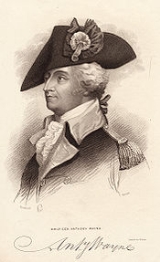
Anthony Wayne
Anthony Wayne was a United States Army general and statesman. Wayne adopted a military career at the outset of the American Revolutionary War, where his military exploits and fiery personality quickly earned him a promotion to the rank of brigadier general and the sobriquet of Mad Anthony Wayne.
Attributed
- Issue the orders Sir, and I will storm Hell.
- when asked by General George Washington if he would undertake the capture of Stony Point
- Forward, my brave fellows, forward! Carry me into the fort. If I am to die, I want to die at the head of the column!
- upon being wounded in the head at Stony Point
- Dear Gen'l, -- The fort & garrison with Col. Johnston are ours. Our officers & men behaved like men who are determined to be free.
- note to Washington after receiving the surrender of Stony Point
Concerning Wayne
- He is firm in constitution, as in resolution; industrious, indefatigable, determined and persevering; fixed in opinion, and unbiased in judgment; not over accessible, but studious to reward merit. He is a rock against which the waves of calumny and malice, moved by the gusts of passion natural to envy, have dashed; have washed its sides: he is still immovable on his base. He is in some degree susceptible of adulation, as is every man who has an honest thirst for military fame. He endures fatigue and hardship with fortitude uncommon for a man of his years. I have seen him, in the most severe night of the winter of 1794, sleep on the ground, like his fellow-soldiers, and walk around the camp at four in the morning, with the vigilance of a sentinel.
- Major William Eaton, commander of the US Marines at Derna, 1806 ("...the Shores of Tripoli..."), of Wayne
- …They also make a distinction between a warrior and a murderer, which, as they explain it, is not much to our advantage. It is not, say they, the number of scalps alone which a man brings with him that prove him to be a brave warrior. Cowards have been known to return, and bring scalps home, which they had taken where they knew was no danger, where no attack was expected and no opposition made. Such was the case with those Christian Indians on the Muskingum, the friendly Indians near Pittsburg, and a great number of scattered, peaceable men of our nation, who were all murdered by cowards. It is not thus that the Black Snake, the great General Wayne acted; he was a true warrior and a brave man; he was equal to any of our chiefs that we have, equal to any that we have ever had…
- Reverend John Heckewelder, in his History, Manners and Customs of the Indian Nations who Once Inhabited Pennsylvania and the Neighboring States, Chapter XXXIII, p. 192. [emphasis added]
